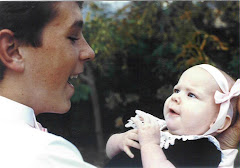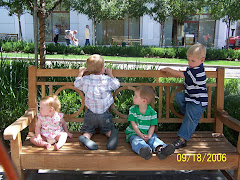On a recent visit home our married son went rummaging through his old footlockers that have been stored in the attic for years. As a teenager every piece of paper, award, trophy and memento that was of true value to him had been carefully stored therein. As each item was pulled out a flood of memories rushed over me as I remembered special events in his life that partially shape who he is today. An old baseball mitt, an award saying “Great Job”, school papers with an A+ marked at the top of each page, old photos of childhood friends, medals and trophies that he had earned. Nothing of real value… or are they? Not in material worth, of course, but each item represented to me a motivational milestone that made him reach a little higher or work a little harder so he could obtain the desired artifact. What surprised me was his current reaction to these items that had once been so valuable to him. I felt the loss of his “Peter Pan” innocence as the man who stood before me merely saw these items as “celebrating mediocrity”.
I’ve given much reflection to this experience and have been silently grateful for those experiences he had. He was motivated by those rewards. They taught him to achieve excellence in areas that I was not capable as a mother to offer him. It was not the medal he got as he crossed the finish line at a Mt. SAC cross country race that was of value… but rather the lessons he learned while earning the medal. Somehow those objects he worked to earn motivated him to achieve.
Children are all unique and no one knows them better or has their best interest at heart like you do as their mother. Motivating our children is more than just helping them “celebrate mediocrity” with the trinkets awarded to them. It is helping them reach their God-given potential and to recognize their uniqueness as an individual.
“Parents often motivate their children to practice skills—inspiring young musicians by taking them to a concert or motivating aspiring athletes by attending college or professional games. But I have found that this principle can also be used to motivate children to develop character traits. When we notice unique talents in our children, we can encourage them. ‘Maybe you will become a writer, or a scientist,’ we might say. If we do this often enough and sincerely enough, our children may have the courage to try out our version of what the future could hold for them. When a trusted parent describes future possibilities, a child pays attention. We can influence our children by helping them define a vision of future possibilities.” Helping Your Children Believe in What They Can Become Lynn Scoresby, “A Future They Can See,” Ensign, Apr 1985, 38
My daughter called the other day and put a different slant of this topic of motivation. She works at Y Be Fit on the BYU-Provo campus. Clients seek her counsel about diet, exercise and fitness. Together they chart out a plan that will work for the client. After a week they come back to review their progress and account to her on the goals they set. Three concepts are put into action 1) motivation 2) a plan, and 3) accountability.
Her comments to me about her job described exactly what we do as mothers for our children. She realized that most of her clients accomplish more when they have someone to whom they are accountable. What she needs to figure out, as their mentor, is what accountability method motivates them to succeed. For some it is making a daily tally sheet, for others it is giving them general guidelines and letting them find their own way. Some unfortunately don’t find the motivation within themselves to change and therefore don’t see any results. As a counselor she can only do so much before it is their responsibility. Each week she teaches them a new principle that they can apply throughout the next seven days. All she can do is hope that they are listening and apply what they have learned to achieve their goals. Some clients function best with only knowing that they will have to report their successes or failures of the week; others need to check off lists; and others need step-by-step instruction on how to live their lives. I hope you can see the correlation here involving motivation between my daughter’s job at Y Be Fit and our job as mothers.
Everyone is motivated by a different method. Our job is to find what works for our child to help them become better and more successful in school, home, church and life in general. It is neither the trophy nor the act of a return and report session that is of value, but rather what personal traits or characteristics are gained in the process. Our task is to find which carrot we need to dangle in front of them that provides the right motivation to propel them to greatness!
Subscribe to:
Post Comments (Atom)

















I really liked this one Mom! Well said.
ReplyDelete